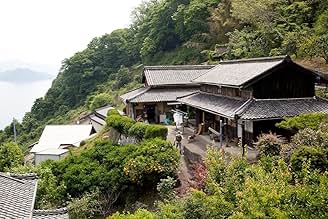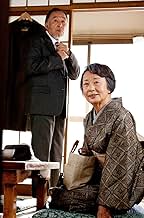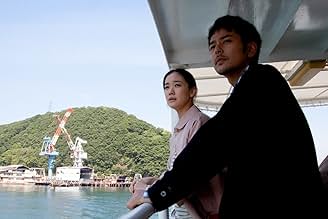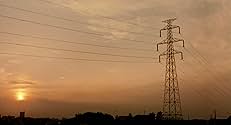AVALIAÇÃO DA IMDb
7,5/10
2,3 mil
SUA AVALIAÇÃO
Adicionar um enredo no seu idiomaIn this update of Yasujiro Ozu's "Tokyo Story", a retired schoolteacher and his wife visit their three working children in modern-day Tokyo.In this update of Yasujiro Ozu's "Tokyo Story", a retired schoolteacher and his wife visit their three working children in modern-day Tokyo.In this update of Yasujiro Ozu's "Tokyo Story", a retired schoolteacher and his wife visit their three working children in modern-day Tokyo.
- Direção
- Roteiristas
- Artistas
- Prêmios
- 2 vitórias e 16 indicações no total
- Direção
- Roteiristas
- Elenco e equipe completos
- Produção, bilheteria e muito mais no IMDbPro
Avaliações em destaque
Cinephiles will tell you about the greatness of Tokyo Story, a 1953 Japanese film directed by Yasujiro Ozu. The story about an aging couple who travel to Tokyo to visit their grown children, only to have them being too busy to pay them much attention, is regarded as one of the most poignant tales ever told on screen. And as with every remarkable piece of work, there is a need to introduce it to a wider audience, hence the contemporary filmmakers' decision to produce Tokyo Family, an interpretation which you can either define as a remake, a tribute or an update.
Yoji Yamada (The Twilight Samurai, The Hidden Blade) takes on this story and gives it a relatable angle to today's viewers. The plot is identical to the classic: An old couple from an isolated part of Japan takes the train to Tokyo to spend time with their grown children, not expecting them to be too occupied and indifferent to host them. A tragic death reunites the family in a quiet country town and has them coming to terms with how they have drifted apart because of selfishness.
Made 60 years after the premiere of Tokyo Story and celebrating the 50th anniversary of the respected Ozu's death, this 146 minute film serves as a kind reminder of the importance of family ties. This is especially current in today's society, considering how new media and social expectations have changed how family members interact with each other.
With that said, Yamada's latest work does not seem to offer anything refreshing. That is nothing surprising though, considering how Yamada was an assistant director of the earlier film. The 1954 graduate of Tokyo University painstakingly attempts to replicate the style of the original, from its slow pacing to how important events are revealed in dialogue instead of being shown on screen.
Those who have watched the original (a large group would probably be film students) may find this version uninspiring, and the younger ones may find their patience being tested with the unhurried storytelling. However, do not let this make you feel that this is an unimportant piece of work. There are still pertinent themes which we as children ought to understand in this evergreen tale. There are times you know how things should work, but nothing works better than a screen visualisation to remind you of how things should be.
There is strong acting from the cast here – Isao Hashizume and Kazuko Yoshiyuki shine in their roles as the unassuming parents who travel to bustling Tokyo from their quiet home on a small island, Masahiko Nishimura's unassuming screen presence gets to you as he plays a GP who runs a clinic from his home, Tomoko Nakajima flaunts her chops as a busy beauty parlour manager, while the charismatic Satoshi Tsumabuki takes on the role of the youngest son who is a freelance stagehand. Each member of the ensemble cast plays his or her character without outshining each other, and gives ample room for performance in the film's many key scenes.
While Tokyo Family may not go down film history as a classic, it is still a commendable piece of work worth your time – if you are willing to sit down and appreciate life's slower moments.
Yoji Yamada (The Twilight Samurai, The Hidden Blade) takes on this story and gives it a relatable angle to today's viewers. The plot is identical to the classic: An old couple from an isolated part of Japan takes the train to Tokyo to spend time with their grown children, not expecting them to be too occupied and indifferent to host them. A tragic death reunites the family in a quiet country town and has them coming to terms with how they have drifted apart because of selfishness.
Made 60 years after the premiere of Tokyo Story and celebrating the 50th anniversary of the respected Ozu's death, this 146 minute film serves as a kind reminder of the importance of family ties. This is especially current in today's society, considering how new media and social expectations have changed how family members interact with each other.
With that said, Yamada's latest work does not seem to offer anything refreshing. That is nothing surprising though, considering how Yamada was an assistant director of the earlier film. The 1954 graduate of Tokyo University painstakingly attempts to replicate the style of the original, from its slow pacing to how important events are revealed in dialogue instead of being shown on screen.
Those who have watched the original (a large group would probably be film students) may find this version uninspiring, and the younger ones may find their patience being tested with the unhurried storytelling. However, do not let this make you feel that this is an unimportant piece of work. There are still pertinent themes which we as children ought to understand in this evergreen tale. There are times you know how things should work, but nothing works better than a screen visualisation to remind you of how things should be.
There is strong acting from the cast here – Isao Hashizume and Kazuko Yoshiyuki shine in their roles as the unassuming parents who travel to bustling Tokyo from their quiet home on a small island, Masahiko Nishimura's unassuming screen presence gets to you as he plays a GP who runs a clinic from his home, Tomoko Nakajima flaunts her chops as a busy beauty parlour manager, while the charismatic Satoshi Tsumabuki takes on the role of the youngest son who is a freelance stagehand. Each member of the ensemble cast plays his or her character without outshining each other, and gives ample room for performance in the film's many key scenes.
While Tokyo Family may not go down film history as a classic, it is still a commendable piece of work worth your time – if you are willing to sit down and appreciate life's slower moments.
A remake of Yasujiro Ozu's Tokyo Story (1953), which is widely regarded as one of the finest films ever made. Director Yoji Yamada follows the plot of the earlier film closely (though he doesn't borrow Ozu's stylistic touches; thus, this is necessarily a more conventional movie).
There are also changes in some of the characters. The youngest children, Kyoko and Keizo, do not exist in this version. Noriko here is not the widowed wife of their fallen son in the war, but the girlfriend of their son Shoji (who is alive here, and works as a theater decorator). Noriko is played by Yu Aoi, who is pretty and charming, though she lacks the screen charisma Setsuko Hara has in the original version (she is given less screen time, also). Also, I notice that in this version the elder children and the grandchildren are less rude to the elder couple. For instance, the eldest daughter Shige, as played as Tomoko Nakajima, is not as mean and bitchy as Haruko Sugimura was in the original. And the grandfather Shukichi, is less nice here than in the original version. He openly questions his children, especially Shoji, which in the original only did obliquely.
Obviously, this film is not up to the level of the original, but it is a well made, pleasant movie to watch.
There are also changes in some of the characters. The youngest children, Kyoko and Keizo, do not exist in this version. Noriko here is not the widowed wife of their fallen son in the war, but the girlfriend of their son Shoji (who is alive here, and works as a theater decorator). Noriko is played by Yu Aoi, who is pretty and charming, though she lacks the screen charisma Setsuko Hara has in the original version (she is given less screen time, also). Also, I notice that in this version the elder children and the grandchildren are less rude to the elder couple. For instance, the eldest daughter Shige, as played as Tomoko Nakajima, is not as mean and bitchy as Haruko Sugimura was in the original. And the grandfather Shukichi, is less nice here than in the original version. He openly questions his children, especially Shoji, which in the original only did obliquely.
Obviously, this film is not up to the level of the original, but it is a well made, pleasant movie to watch.
Yamada Yoji has been directing films since 1961, but internationally is best known for his late-career "Samurai Trilogy" (2002 - 2006). There is always a heavy dose of nostalgia in his films and this one is no exception! Director Yoji Yamada delayed principal photography of Tokyo Kazoku, a remake of Yasujiro Ozu's Tokyo Story, from the beginning of April 2011 due to the devastating Tohoku earthquake and tsunami, and subsequent Fukushima meltdown, which occurred on March 11th 2011... from the beginning nothing was going easy!
Remaking a film like "Tokyo monogotari" (Tokyo Story, 1954), the Ozu film that is repeatedly voted to be the greatest film of all time, was very challenging task. I love the result - re-imagining of the original, with contemporary setting and some differences which could be almost called improvements!
Likeable faces with excellent acting skills, combined with great camera work and interesting cinematography revoking some old Ozu styles. As well as great directing, made this family drama one of the best ones coming from Japan.
Remaking a film like "Tokyo monogotari" (Tokyo Story, 1954), the Ozu film that is repeatedly voted to be the greatest film of all time, was very challenging task. I love the result - re-imagining of the original, with contemporary setting and some differences which could be almost called improvements!
Likeable faces with excellent acting skills, combined with great camera work and interesting cinematography revoking some old Ozu styles. As well as great directing, made this family drama one of the best ones coming from Japan.
9/10
watched an amazing film this morning just when i was trying to get to sleep after another "up till sunrise" night it's called Tokyo Family by Yôji Yamada, a tribute to legendary Japanese director Yasujirô Ozu and his most famous film, Tokyo Story from 1953 it's quite similar in idea, where older parents from a country sea side town come to Tokyo to visit their kids / grand kids, but no one really has time for them Tokyo has this high paced way of living, while in the country the old folks just kick back and enjoy life go by
the relationship between the father and son reminded me of my situation with dad who recently passed away - my personality & outlook in life is like mine while the fathers is like my dad also there's a death in the film where the whole family has to go thru, very sudden like dad's circumstances
it destroyed me, but in a good way cause it allowed be to grieve a bit more, cause I've been resisting it a bit since dad's funeral it really is a heart breaking film, and like death it is hard for all family members to endure in the film the funeral & wake were very beautiful, respectful all the family got together like we all did it finishes on a positive note that life must go on, the father becomes more accepting of the son & vice versa thru this death in the family they break their stand off between each other and bond in their own unique way
instant 9/10 & keen to watch it again u should too, to see the contrasts between generations, traditions & cities old times compared to modern times something that will be timeless, just like Yamada modernising the Ozu 50s masterpiece with another masterpiece that will be also treasured for generations to come
watched an amazing film this morning just when i was trying to get to sleep after another "up till sunrise" night it's called Tokyo Family by Yôji Yamada, a tribute to legendary Japanese director Yasujirô Ozu and his most famous film, Tokyo Story from 1953 it's quite similar in idea, where older parents from a country sea side town come to Tokyo to visit their kids / grand kids, but no one really has time for them Tokyo has this high paced way of living, while in the country the old folks just kick back and enjoy life go by
the relationship between the father and son reminded me of my situation with dad who recently passed away - my personality & outlook in life is like mine while the fathers is like my dad also there's a death in the film where the whole family has to go thru, very sudden like dad's circumstances
it destroyed me, but in a good way cause it allowed be to grieve a bit more, cause I've been resisting it a bit since dad's funeral it really is a heart breaking film, and like death it is hard for all family members to endure in the film the funeral & wake were very beautiful, respectful all the family got together like we all did it finishes on a positive note that life must go on, the father becomes more accepting of the son & vice versa thru this death in the family they break their stand off between each other and bond in their own unique way
instant 9/10 & keen to watch it again u should too, to see the contrasts between generations, traditions & cities old times compared to modern times something that will be timeless, just like Yamada modernising the Ozu 50s masterpiece with another masterpiece that will be also treasured for generations to come
To understand how this film came about, you got to know a little bit of background about the director, Yamada Yoji. Though he may be internationally best known for his late-career "Samurai Trilogy" (2002 - 2006), Yamada has been directing films since 1961, and is best known for films that are set in the contemporary present, but feature a heavy dose of nostalgia. Yamada started his career at Shochiku, the same studio where Ozu worked. Though he initially tried to make films very opposite to the Ozu style, he came to be compared to Ozu time and time again, as the years went on. Yamada himself blames the Kamata studio style, which is present in the films of many older Shochiku directors.
I like Yamada quite a bit, though he is nowhere near the master of cinema that Ozu was. The core difference between them is that Ozu depicted the sentiments of his contemporary society. Yamada's films have very similar sentiments, but from a nostalgic viewpoint. Less "mono no aware" and more of a longing to a childhood home, tragicomic everyday realism with warm undertones and soft narratives. At his darkest, Yamada is not as dark as Ozu, and at his funniest, he is not as hilarious. He is good, balanced, and humane, and his works benefit if you don't compare the two.
But I guess Yamada couldn't help himself from eventually remaking an Ozu film, after making Ozu-esque films for 52 years (!). "Tôkyô kazoku" (Tokyo Family, 2013) is a remake of "Tokyo monogotari" (Tokyo Story, 1954), the Ozu film that is repeatedly voted to be the greatest film of all time. Because of the casual nature of the the narrative, it is not exactly like remaking "Vertigo" (1958) or "Citizen Kane" (1941), but you've got to admit: it's a challenge. Instead of making a scene-for-scene remake (god forbid!), this is more of a re-imagining of the original, with contemporary setting and some differences made.
I came in with an open mind, and the initial reaction was good. The original Ozu film was in black and white, Yamada's film is in color, but he has chosen a color palette that resembles that of Ozu's late-career color films like "Ohayo" (Good Morning, 1959). In hindsight, Yamada would have been wise to remake "Ohayo" instead. "Ohayo" is a comedic and pretty relaxed narrative, a good fit for Yamada, and in itself a remake of an earlier Ozu film (1932). It could have been updated, just change the television set of the 1959 film into a computer, or an iPhone or something. Not necessary a masterwork, but Yamada could manage the tone. "Tokyo Story" is too dark for Yamada. Ozu described it as one of his most melodramatic pictures, and Yamada's softball approach does not resonate with the narrative. The dramatic tension is not very high, and we feel too much sympathy for every single character.
The original film was told largely from the perspective of the parents who come to visit their adult children in Tokyo. This film does the opposite, and starts with the children. Therefore we come to understand their perspective too much, and they are made too kind for the film's core thesis to come through. Yamada's film is cozy and the nostalgia he has for the olden day family idyll goes opposite to Ozu's thematic about the selfishness of the modern generation. Because the drama doesn't bite, the film starts to feel slow, which is something I never felt with any Ozu film, though they were long. I feel bad watching this, because Yamada is talented and can do several things very well. This film highlights what he can't do.
All this being said, the film carries some charm from the original, though it doesn't add much. Some scenes have become too iconic to change, and are thus too similar to the originals. The acting is very good throughout, as Yamada films are always full of likable faces.
I like Yamada quite a bit, though he is nowhere near the master of cinema that Ozu was. The core difference between them is that Ozu depicted the sentiments of his contemporary society. Yamada's films have very similar sentiments, but from a nostalgic viewpoint. Less "mono no aware" and more of a longing to a childhood home, tragicomic everyday realism with warm undertones and soft narratives. At his darkest, Yamada is not as dark as Ozu, and at his funniest, he is not as hilarious. He is good, balanced, and humane, and his works benefit if you don't compare the two.
But I guess Yamada couldn't help himself from eventually remaking an Ozu film, after making Ozu-esque films for 52 years (!). "Tôkyô kazoku" (Tokyo Family, 2013) is a remake of "Tokyo monogotari" (Tokyo Story, 1954), the Ozu film that is repeatedly voted to be the greatest film of all time. Because of the casual nature of the the narrative, it is not exactly like remaking "Vertigo" (1958) or "Citizen Kane" (1941), but you've got to admit: it's a challenge. Instead of making a scene-for-scene remake (god forbid!), this is more of a re-imagining of the original, with contemporary setting and some differences made.
I came in with an open mind, and the initial reaction was good. The original Ozu film was in black and white, Yamada's film is in color, but he has chosen a color palette that resembles that of Ozu's late-career color films like "Ohayo" (Good Morning, 1959). In hindsight, Yamada would have been wise to remake "Ohayo" instead. "Ohayo" is a comedic and pretty relaxed narrative, a good fit for Yamada, and in itself a remake of an earlier Ozu film (1932). It could have been updated, just change the television set of the 1959 film into a computer, or an iPhone or something. Not necessary a masterwork, but Yamada could manage the tone. "Tokyo Story" is too dark for Yamada. Ozu described it as one of his most melodramatic pictures, and Yamada's softball approach does not resonate with the narrative. The dramatic tension is not very high, and we feel too much sympathy for every single character.
The original film was told largely from the perspective of the parents who come to visit their adult children in Tokyo. This film does the opposite, and starts with the children. Therefore we come to understand their perspective too much, and they are made too kind for the film's core thesis to come through. Yamada's film is cozy and the nostalgia he has for the olden day family idyll goes opposite to Ozu's thematic about the selfishness of the modern generation. Because the drama doesn't bite, the film starts to feel slow, which is something I never felt with any Ozu film, though they were long. I feel bad watching this, because Yamada is talented and can do several things very well. This film highlights what he can't do.
All this being said, the film carries some charm from the original, though it doesn't add much. Some scenes have become too iconic to change, and are thus too similar to the originals. The acting is very good throughout, as Yamada films are always full of likable faces.
Você sabia?
- CuriosidadesDirector Yoji Yamada delayed principal photography of Tokyo Kazoku, a remake of Yasujiro Ozu's Tokyo Story, from the beginning of April 2011 due to the devastating Tohoku earthquake and tsunami, and subsequent Fukushima meltdown, which occurred on March 11th 2011. He would have to recast the film and partly reworked the script to reflect post-3/11 Japan.
- ConexõesReferenced in Kazoku wa tsuraiyo (2016)
Principais escolhas
Faça login para avaliar e ver a lista de recomendações personalizadas
- How long is Tokyo Family?Fornecido pela Alexa
Detalhes
- Data de lançamento
- País de origem
- Central de atendimento oficial
- Idioma
- Também conhecido como
- Tokyo Family
- Empresas de produção
- Consulte mais créditos da empresa na IMDbPro
Bilheteria
- Faturamento bruto mundial
- US$ 17.370.130
- Tempo de duração
- 2 h 26 min(146 min)
- Cor
- Mixagem de som
- Proporção
- 1.85 : 1
Contribua para esta página
Sugerir uma alteração ou adicionar conteúdo ausente




























